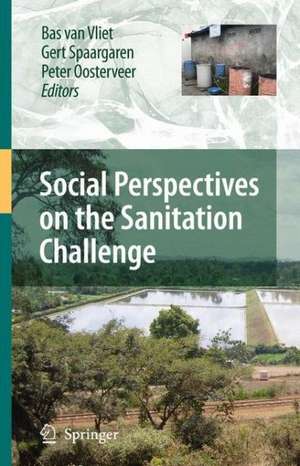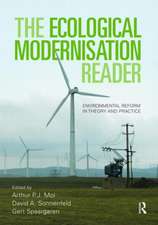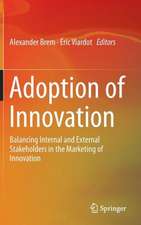Social Perspectives on the Sanitation Challenge
Editat de Bas van Vliet, Gert Spaargaren, Peter Oosterveeren Limba Engleză Paperback – 16 oct 2014
| Toate formatele și edițiile | Preț | Express |
|---|---|---|
| Paperback (1) | 638.57 lei 6-8 săpt. | |
| SPRINGER NETHERLANDS – 16 oct 2014 | 638.57 lei 6-8 săpt. | |
| Hardback (1) | 644.82 lei 6-8 săpt. | |
| SPRINGER NETHERLANDS – 15 mar 2010 | 644.82 lei 6-8 săpt. |
Preț: 638.57 lei
Preț vechi: 751.25 lei
-15% Nou
Puncte Express: 958
Preț estimativ în valută:
122.23€ • 132.81$ • 102.74£
122.23€ • 132.81$ • 102.74£
Carte tipărită la comandă
Livrare economică 21 aprilie-05 mai
Preluare comenzi: 021 569.72.76
Specificații
ISBN-13: 9789400791619
ISBN-10: 9400791615
Pagini: 256
Ilustrații: XIII, 242 p.
Dimensiuni: 155 x 235 x 13 mm
Greutate: 0.37 kg
Ediția:2010
Editura: SPRINGER NETHERLANDS
Colecția Springer
Locul publicării:Dordrecht, Netherlands
ISBN-10: 9400791615
Pagini: 256
Ilustrații: XIII, 242 p.
Dimensiuni: 155 x 235 x 13 mm
Greutate: 0.37 kg
Ediția:2010
Editura: SPRINGER NETHERLANDS
Colecția Springer
Locul publicării:Dordrecht, Netherlands
Public țintă
ResearchCuprins
Social Scientific Concepts of Provisioning Sanitation Services.- Meeting Social Challenges in Developing Sustainable Environmental Infrastructures in East African Cities.- Sense and Sanitation.- Providing Sanitation for the Urban Poor in Uganda.- Decision-Making Tools.- A Flowstream Approach for Sustainable Sanitation Systems.- A Learning and Decision Methodology for Drainage and Sanitation Improvement in Developing Cities.- Perceptions of Local Sustainability in Planning Sanitation Projects in West Africa.- Interactions Between Urban Forms and Source-Separating Sanitation Technologies.- Reconsidering Urban Sewer and Treatment Facilities in East Africa as Interplay of Flows, Networks and Spaces.- Meeting the Sanitation Challenge in Sub-Saharan Cities: Lessons Learnt from a Financial Perspective.- Perspectives from Farmers and End-Users.- Role of Farmers in Improving the Sustainability of Sanitation Systems.- Governing Peri-Urban Waste Water Used by Farmers: Implications for Design and Management.- End User Perspectives on the Transformation of Sanitary Systems.- Conclusion and Discussion.
Textul de pe ultima copertă
If the goal is to half the number of people without sustainable access to safe drinking water and basic sanitation by 2015, we may not only need new technologies but rather innovative sanitation concepts, new tools for decision-making and an understanding of diverse stakeholder perspectives along the sanitation chain. Social Perspectives on the Sanitation Challenge presents a timely collection of papers from the perspectives of Science and Technology Studies, Environmental Sociology and Urban Studies. Together they comprise a valuable resource for political scientists, environmental engineers and urban planners whose work is aimed at meeting the ambitious Millennium Development Goal on sanitation.
The book’s main message is that we need to go beyond traditional dichotomies between either ‘small, appropriate’ or ‘modern, advanced’ sanitation solutions in solving the global sanitation challenge and to develop sanitation with a mix of scales, strategies, technologies, payment systems and decision-making structures that better fit the physical and societal systems for which they are designed.
In the developing world the challenge is to provide sanitation services to the poor and the very poor, without compromising on sustainability. In this realm, the book presents new configurations that employ the best practices of sanitation technology and management for rural and urban contexts.
In developed countries the challenge is to initiate a transition from strongly centralized, water-based infrastructure regimes towards more sustainable sanitation regimes. This has raised questions on sanitation concept development, demonstration, institutional learning and governance building to which this book provides some innovative social scientific answers.
Social Perspectives on the Sanitation Challenge is unique in its presentation of research findings from urban planners, sociologists,economists, political scientists and environmental engineers. Its empirical scope, stretching from Western Europe to Sub-Saharan Africa, is deliberately wide to stress the global character of the sanitation challenge that we all face.
The book’s main message is that we need to go beyond traditional dichotomies between either ‘small, appropriate’ or ‘modern, advanced’ sanitation solutions in solving the global sanitation challenge and to develop sanitation with a mix of scales, strategies, technologies, payment systems and decision-making structures that better fit the physical and societal systems for which they are designed.
In the developing world the challenge is to provide sanitation services to the poor and the very poor, without compromising on sustainability. In this realm, the book presents new configurations that employ the best practices of sanitation technology and management for rural and urban contexts.
In developed countries the challenge is to initiate a transition from strongly centralized, water-based infrastructure regimes towards more sustainable sanitation regimes. This has raised questions on sanitation concept development, demonstration, institutional learning and governance building to which this book provides some innovative social scientific answers.
Social Perspectives on the Sanitation Challenge is unique in its presentation of research findings from urban planners, sociologists,economists, political scientists and environmental engineers. Its empirical scope, stretching from Western Europe to Sub-Saharan Africa, is deliberately wide to stress the global character of the sanitation challenge that we all face.
Caracteristici
The book highlights social and institutional aspects of Sanitation issues Reference book for all committed to the UN Millennium Development Goal of halving, by 2015, the proportion of people without sustainable access to safe drinking water and basic sanitation Unique collection of comparative European and African case studies Offers worthwhile insights for engineers in sanitation as well as water and sanitation policy makers Includes supplementary material: sn.pub/extras















